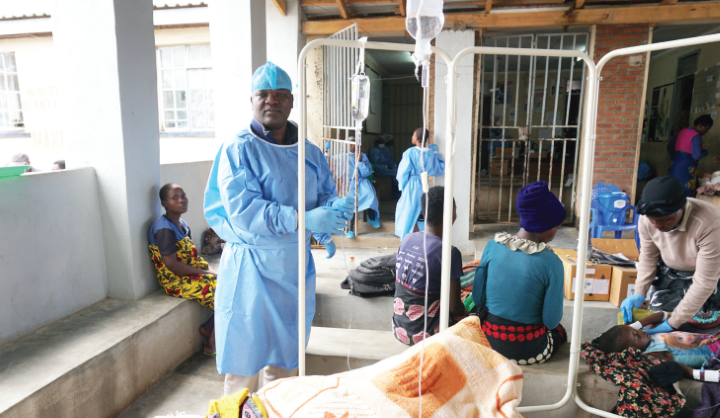Saving children through SMS
 Nele Pangeni gave birth at Chikhwawa District Hospital in May 2011. The baby weighed 2.8 kilogrammes.
Nele Pangeni gave birth at Chikhwawa District Hospital in May 2011. The baby weighed 2.8 kilogrammes.
Pangeni, 41, who comes from Pangeni Village, Traditional Authority Pangeni in the district, did not know that she was HIV positive.
“When I came for my first antenatal visit at four months pregnant, I was tested for HIV and was found to be negative. But after the baby was born, we both were constantly sick. I suspected that I could be positive and this was confirmed when I heard that my husband’s other wife is on anti-retroviral treatment (ARVs). That’s when I went for another test and I was positive,†says Pangeni, who is in a polygamous marriage, common in the Lower Shire.
She and her daughter, Rita, have been on ARVs for three months now.
Three weeks ago, Pangeni was among several women who had their babies checked for malnourishment. Hospital records indicate that when she first took her baby for the service two months ago, the baby’s weight was 6 kg and her height was 65 cm.
This information was then sent by a health surveillance assistant (HSA) to a central server through a Short Message Service (SMS). A response was given that Rita was indeed malnourished and she had to immediately start therapy.
She is now enrolled at the hospital’s Out-Patient Therapeutic Programme (OTP) where she will be visiting once a week for four weeks until her condition improves.
 “Children on OTP are those whose weight and height is less than 80 percent of the required measurements. When they come for the programme, mothers are counselled on the need to give their children six food groups through mix feeding, where the foods are pounded and mixed with porridge,†explained Felista Kupusa, home craft worker at the hospital.
Kupusa further said the children are also given ready to eat food like plumpy nut (fortified peanut butter) and drugs.
She added: “After the baby gets better, they are enrolled in the Supplementary Feeding Programme where they get corn-blend soy flour mixed with cooking oil every two weeks for another four weeksâ€.
Rita now weighs 7.2 kg and she is 66.5 cm tall. She has so far passed her target weight gain of 6.5 kg.
Two years ago, Unicef introduced the Rapid SMS programme to speed up the process of providing treatment to children in public hospitals. So far, three of Malawi’s mobile service providers, namely Airtel, TNM and Access, are being utilised.
 “What happens is that when a child comes for the under-five clinic, the HSA records its weight, height, edema and medium upper arm circumference (Muac), then sends this information to the central server and they get a response if that child is malnourished or not, and on the type of treatment it requires,†explained John Mugawa, nutritional coordinator for Chikhwawa District.
The system is also used in testing children for HIV, where the health worker collects samples and sends them to the Central Lab in Blantyre, and later the lab sends the results via SMS. This usually takes three to four weeks.
Mugawa says the system is helping save lives as more children are diagnosed early for both malnutrition and HIV and as such, they are able to receive the treatment on time.
“Before the Rapid SMS programme, results came very late (after three months) but now children are being put on ART and/or on Ready to Use Therapeutic treatment on time. If a child is born from an HIV positive mother, the samples are sent to the central lab in Blantyre.
“The programme has also helped enrol children who were not identified before—both newborns and under five children—and it notifies the health worker when a child is due for another visit,†he said.
Apart from this project, Unicef promotes exclusive breastfeeding and best feeding practices, hygiene as well as community outreach.
“We believe, through these programmes, mothers are having first hand information on what is expected of them in as far as the reduction of malnutrition among under five children is concerned,†said Unicef chief of communications Victor Chinyama.
Chinyama said through the Rapid SMS programme, more children are now being enrolled on the central system in the district which previously relied on data provided by the St Louis Nutrition project of the College of Medicine.
All newborns are also entered into the system and their mothers are notified when their child is due for a hospital visit.
“This, we hope, will also help in the national registration programme of children which the government hopes to carry out soon so that every child has a birth certificate and is able to obtain a passport later on,†said Chinyama.
Malawi is only one of nine low-income countries worldwide that have reduced their under-five mortality rate by over 60 percent.
A Unicef report released on September 13 titled ‘Committing to Child Survival: A Promise Renewed,’ says child mortality in sub-Saharan Africa has come down with 39 percent and globally it is at 42 percent from nearly 12 million in 1992 to 6.9 million in 2011.
Â





